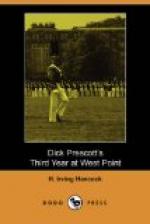“Don’t josh me too hard, Chief,” pleaded the medicine fakir “Will you let my people go, if I settle?”
“These terrors,” retorted Chief Simmons, “are about due for thirty days for disturbing the peace.”
“But that would bust my summer season, Chief,” pleaded “Wild Charlie.”
“Oh, don’t run these innocents in, Chief,” urged Tom Reade. “They aren’t really bad, and they admitted it as soon as we told ’em so. These people are not dangerous—–only a bit nervous.”
“See here, Wild Charlie,” grinned the chief of police, “I don’t want to do anything to make you wilder. I’ll let these human picture books go on condition that you take your show at once and clear on out of town.”
“I may just as well go,” sighed the long-haired one. “This job has ruined my business here. And say, Chief, won’t you break the guns and knock the cartridges out, and then let me have the guns, too? They cost a lot of money!”
But on this point Chief Simmons was firm.
“No, sirree! You can take your infant terrors and load them on the first train away from here. But the revolvers are confiscated, Wild Charlie, and they’ll stay here. You can try to recover the revolvers by a civil suit, if you want to risk it in court. Otherwise, make your get-away as fast as you can. I’ll admit that your outfit had the josh on me, and had me tickling the wire for the reserves. But just now the town holds two West Point cadets, and two young engineers from the real West, which makes Gridley no place to turn a vaudeville powder-play loose in.”
“Wild Charlie” and his band fled as fast as they could, for the crowd was jeering loudly and talking of taking all six to the nearest horse-trough for a ducking.
“Is that the best the old town can do for excitement in these days?” laughed Reade, as soon as our young friends had separated themselves from the laughing crowd and had started on a stroll.
“Why, that little episode was doing well enough for any town,” smiled Dick. “A laugh is better than a fight, any day.”
“Queer text for a soldier to preach from,” grinned Hazelton.
“Not a bit,” Dick retorted. “The soldier, above all men, hates a fight, for the soldier knows he’s the only one that’s likely to get hurt.”
“Oho!”
“Yes; and moreover,” broke in Greg, “armies aren’t organized, in the first place, for fighting, but for preserving peace.”
“Just as railroads are built to keep people from traveling,” jeered Reade.
“If we don’t look out the greatest excitement that we’ll find today will be starting a fight among ourselves,” warned Harry dryly.
“Rot!” scoffed Tom. “The old chums of Dick & Co. couldn’t fight each other, any more that they can avoid joshing each other.”
Though none of the chums guessed it, excitement enough for two of them, possible, was brewing in another part of Gridley at that moment.




